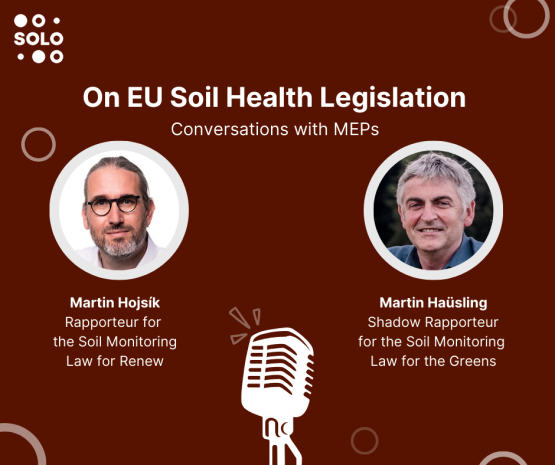
SOLO Interviews MEPs on EU Soil Health Legislation: Insights into the Future of Soil Protection
Soil is one of the key components of life on Earth, hosting biodiversity and functions on which all life depends. Soils are estimated to be home to about 59% of the Earth’s species. About 90% of earth’s fungi, 85% of plants and more than 50% of bacteria live in soils. It is the source of 95% of food and is crucial for storing and filtering water and climate change mitigation and adaptation. Yet, soils have been deteriorating fast. Over 60% of EU soils are estimated to be unhealthy due to pollution, erosion, loss of soil biodiversity and organic carbon, compaction, sealing and more. Therefore, the EU wants to take concrete steps to restore soil health in the EU, better monitor soils, increase knowledge, and create a level playing field among EU Member States.
In 2021, the Commission came up with a new EU Soil Strategy for 2030, which is part of the EU Biodiversity Strategy for 2030. The new Soil Strategy set ground and objectives for soil monitoring, protection, restoration and sustainable use of soils, building towards achieving healthy soils in the EU by 2050. On 5 July 2023, a legislative proposal for a Directive on Soil Monitoring and Resilience was published by the European Commission as a cornerstone of the EU Soil Strategy and the EU’s Zero Pollution ambition.
Since then, the European Parliament and the Council have been defining their positions on the text. The Parliament took on a position in April 2024, and the Council agreed on a common approach in June 2024. Consequently, discussions among the Parliament, Council and Commission have been ongoing. An agreement is expected to be reached on 9 April 2025, after which voting in the Committee on Environment, Public Health and Food Safety, and in the Plenary of the European Parliament, will take place.
SOLO partners Carlos António Guerra (University of Coimbra), Kristine De Schamphelaere (PAN Europe) and Roger Roca Vallejo (ICLEI Europe) had the opportunity to sit down with two Members of Parliament and ask them about the context of EU legislation on soils, the law, and its key aims and potential. They discussed how projects such as SOLO and science in general can contribute to supporting policy makers at an EU and national level, supporting the implementation of the directive.
As rapporteur for the directive in the Parliament, Member of Parliament Martin Hojsík (Renew, Slovakia) is responsible for coordinating the legislative proposal in the EU Parliament. Member of Parliament Martin Häusling (the Greens/EFA, Germany) is shadow rapporteur for the file for the EU Greens political group.
You can watch both videos below, as well as on SOLO’s YouTube channel.